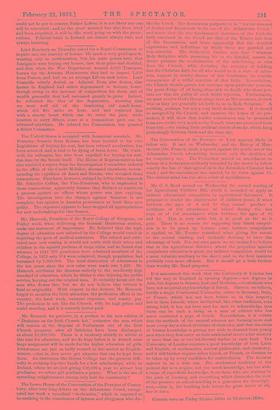It is announced this week that the University of London
has led the way in England in opening degrees,—not degrees in Arts, but degrees in Science, Law, and Medicine,—to students who have not acquired any knowledge of Greek. There is, we believe, hardly a single Continental University, either in Germany, Italy, or France, which has not been before us in this respect ; but in these Islands, where intellectual, like other traditions, take strong hold, it has not been easy for men to acknowledge that there can be such a thing as a man of culture who has never construed a page of Greek. Nevertheless, it is certain that the methods of the natural sciences are forming more and more every day a school of culture of their own, and that the circle of human knowledge is getting too wide to demand from young men when they first enter on their academical career a fair mastery of more than one or two intellectual studies in each kind. The University of London requires a good knowledge of both Latin and English, of mathematics, natural philosophy, and chemistry, and it will further require either Greek, or French, or German to be taken up by every candidate for matriculation. The decision appears to us a wise one. The academical tendency of the present day is to require not too much knowledge, but too wide a range of superficial knowledge, from those who are starting in the path of learning, and everything which diminishes the area of the pressure on school-teaching is a guarantee for thorough- ness,—that is, for teaching lads better the great secret of all, how to learn.


































 Previous page
Previous page